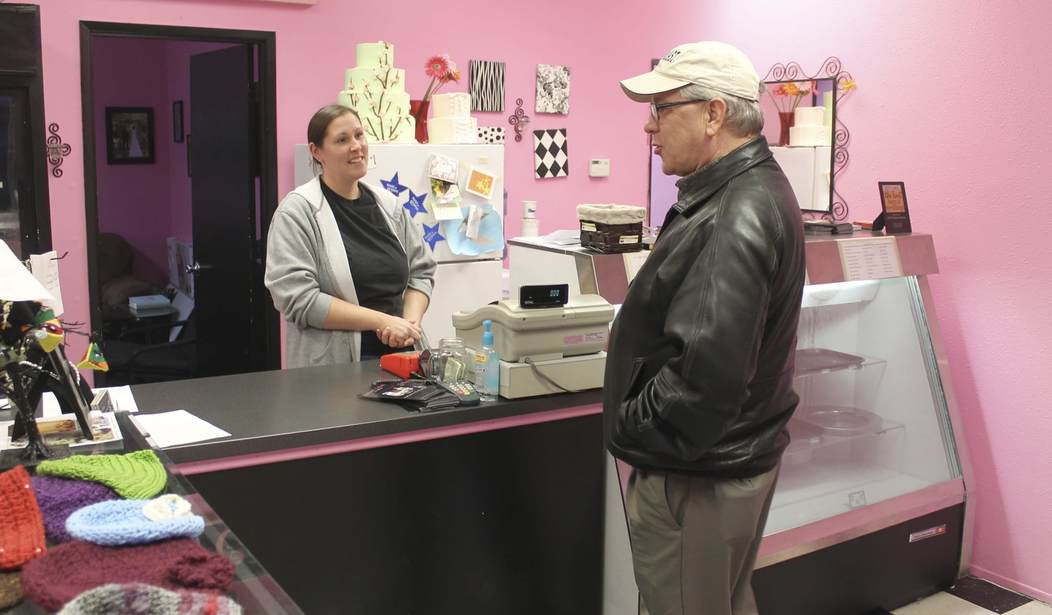On Monday, Aaron and Melissa Klein, the erstwhile owners of the bakery Sweet Cakes by Melissa, asked the Supreme Court to take up their case. In 2013, the Kleins refused to bake a custom cake to celebrate a same-sex wedding. A state bureaucracy fined them more than their life savings, driving them into bankruptcy and costing them their business.
“Free Americans should never be compelled by the government to create a message that conflicts with their deepest convictions,” Jeremy Dys, deputy general counsel at First Liberty, the legal firm representing the Kleins, told PJ Media on Monday. He argued that the Sweet Cakes case “provides a very good vehicle for the Court to clarify whether speech is truly free.”
The Kleins gladly served all people, regardless of sexual orientation. Even so, they could not in good conscience craft a cake to celebrate a same-sex wedding. Sweet Cakes by Melissa did not mass-produce cakes, but only crafted cake art for specific events. The bakery became deeply involved with every wedding it celebrated, and therefore could not take on a same-sex wedding.
In 2011, Rachel Cryer and Laurel Bowman, a lesbian couple, requested a cake to celebrate the marriage of Rachel’s mother to a man. The Kleins, knowing Cryer and Bowman were homosexual, gladly took the order, and the couple were so happy with the cake that they wanted Sweet Cakes to make a similar cake for their own ceremony.
When the Kleins denied this latter order, Cryer and Bowman went to the Oregon Bureau of Labor and Industries (BOLI), complaining that they had been “mentally raped” by the rejection. BOLI ruled that Sweet Cakes by Melissa had discriminated against Cryer and Bowman due to their sexual orientation, and slapped a $135,000 fine on the Kleins, in addition to a gag order.
While the gag order was later lifted, an appeals court upheld the fine in December 2017. In June 2018, the Oregon Supreme Court refused to hear the case, without giving an explanation.
The Kleins were able to raise a great deal of money on GoFundMe, until a mob pressured the crowdfunding site to take down the page. The bakery closed in 2016.
Dys suggested that the Supreme Court should take up the case for multiple reasons.
Many similar cases have presented the question of whether or not small businesses can refuse to lend their artistic talents to celebrate an event they disagree with, particularly a same-sex wedding.
In Masterpiece Cakeshop v. Colorado Civil Rights Commission (2018), the Supreme Court ruled in favor of Jack Phillips, a baker who refused to craft a cake for a same-sex wedding. The Court did not settle the central free speech and religious freedom issue, however.
Sweet Cakes gives the Supreme Court a chance “to resolve probably the most critical issue that Masterpiece left unresolved, whether the government can force individuals to create a message contrary to their religious beliefs,” Dys argued.
“For engaging their right to free speech, Aaron and Melissa lost their business,” the lawyer lamented. “The government here bankrupted a business because they viewed the owners’ religious speech as unpopular, but the First Amendment is supposed to protect speech whether it is popular or not.”
Dys quoted Supreme Court Justice Neil Gorsuch’s concurring opinion in Masterpiece, noting that “popular religious views are easy enough to defend. It is in protecting unpopular religious beliefs that we prove this country’s commitment to serving as a refuge for religious freedom.”
Oregon “forced Aaron and Melissa to choose between their faith and their livelihood,” and that sends small businesses across America a terrifying message, the lawyer argued.
“Think of all the thousands of small business owners out there right now who have a religious motivation behind their work,” Dys explained. “There are hundreds of small businesses, one-man shops, one-woman shops, mom-and-pop shops that simply want to abide by their religious convictions.”
So long as the Supreme Court is silent on this issue, “you’ve got so many different small business owners wondering, ‘Am I going to be next?'”
This case “sends a message to every American that they’re in danger if the Supreme Court is going to approve of an administrative agency in the State of Oregon compelling the speech of its citizens.”
Until the Supreme Court takes up the Kleins’ case and rules in their favor, small businesses must live in fear that the government will force them to abandon their convictions.
Follow the author of this article on Twitter at @Tyler2ONeil.









Join the conversation as a VIP Member